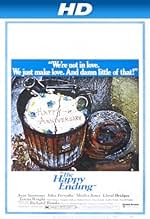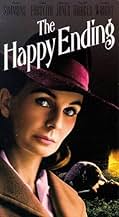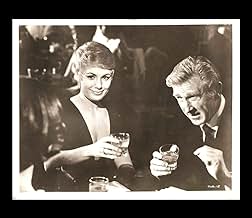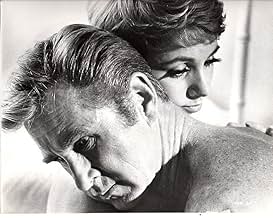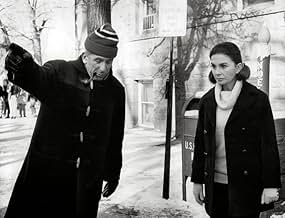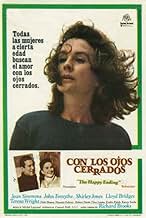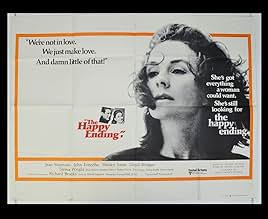IMDb RATING
6.3/10
1.4K
YOUR RATING
A middle-aged woman walks out on her husband and family in an desperate attempt to find herself.A middle-aged woman walks out on her husband and family in an desperate attempt to find herself.A middle-aged woman walks out on her husband and family in an desperate attempt to find herself.
- Nominated for 2 Oscars
- 5 nominations total
Bobby Darin
- Franco
- (as Robert Darin)
William O'Connell
- Minister
- (as Wm. O'Connell)
Ingrid Bergman
- Self - Actress in 'Casablanca'
- (archive footage)
- (uncredited)
Humphrey Bogart
- Self - actor in 'Casablanca'
- (archive footage)
- (uncredited)
- Director
- Writer
- All cast & crew
- Production, box office & more at IMDbPro
Featured reviews
I love movies that come down hard against conventional life. And the ones that feature nagging, chronically unhappy, never-satisfied married people go in my "horror" stack, along with Halloween, Videodrome, Suspiria, The Fog, etc. Watching that way of life is enough to fill anyone with ineffable dread.
When you consider that lead actress Jean Simmons and director Richard Brooks (married 1960-1977) were on their way to divorce, that just adds to the terror.
Though it echoes themes in Charlotte Perkins Gilman's The Yellow Wallpaper (1899), The Happy Ending is still seen as a proto-feminist text, which it well may be. I've long held that Jean Simmons (or at least the "Jean Simmons image") is not this quiet, polite, understated "demure beauty" that is somehow constantly breaking out of that particular mold. Ms. Simmons herself can be seen as a "proto-feminist" or strong female lead actress. She demonstrates this in Hamlet, Desiree, Young Bess, The Big Country, and certainly Elmer Gantry; one could actually make this case for many of her films available on video.
Her part in The Happy Ending is really just an expansion of these roles, only this time, the unhappy marriage is brought to the fore instead of subsumed in Hollywood/Happy ending resolve.
It's not just proto-feminist women who feel trapped by marriage; that men get cold feet and then have affairs is almost too cliché to mention or bother to put in quotes. How many movies about extramarital affairs have entertained millions? This film just happens to present the unthinkable horror of when a woman wants out of it. Good for them. 8/10, but be advised, this is coming from someone unable to resist movies about women who don't want to be married.
To this end, see it as a double feature with Baby Doll (1956), or Possession (1981), mess up your mind, a little.
When you consider that lead actress Jean Simmons and director Richard Brooks (married 1960-1977) were on their way to divorce, that just adds to the terror.
Though it echoes themes in Charlotte Perkins Gilman's The Yellow Wallpaper (1899), The Happy Ending is still seen as a proto-feminist text, which it well may be. I've long held that Jean Simmons (or at least the "Jean Simmons image") is not this quiet, polite, understated "demure beauty" that is somehow constantly breaking out of that particular mold. Ms. Simmons herself can be seen as a "proto-feminist" or strong female lead actress. She demonstrates this in Hamlet, Desiree, Young Bess, The Big Country, and certainly Elmer Gantry; one could actually make this case for many of her films available on video.
Her part in The Happy Ending is really just an expansion of these roles, only this time, the unhappy marriage is brought to the fore instead of subsumed in Hollywood/Happy ending resolve.
It's not just proto-feminist women who feel trapped by marriage; that men get cold feet and then have affairs is almost too cliché to mention or bother to put in quotes. How many movies about extramarital affairs have entertained millions? This film just happens to present the unthinkable horror of when a woman wants out of it. Good for them. 8/10, but be advised, this is coming from someone unable to resist movies about women who don't want to be married.
To this end, see it as a double feature with Baby Doll (1956), or Possession (1981), mess up your mind, a little.
When I first saw THE HAPPY ENDING, back in 1970, I was blown over by the film's sensitive portrayal of an unhappy housewife trying to decide what to do with her life. I took family and friends to see it and most people liked the film, finding it unusually frank as a portrayal of a failed marriage. I still find THE HAPPY ENDING very good. It is aesthetically rooted in the late sixties but that does not diminish its essential value. The all-star cast is excellent (Jean Simmons, John Forsythe, Teresa Wright, Nanette Fabray, Shirley Jones, Bobby Darin, Lloyd Bridges, Tina Louise) and Jean Simmons might have shared the Oscar with Maggie Smith that year. Both actresses deserved to receive acting honors for their respective roles. I love the jazzy music score by Michel Legrand; Marilyn & Alan Bergman's beautiful song-theme for the film is a perennial favorite of mine as far as romantic songs are concerned. All in all, I will always have a special place in my heart for THE HAPPY ENDING.
Take a good look at the film credits of Jean Simmons especially during the Fifties and you'll find that woman has been in some of the best movies ever made. Yet nary an Oscar nomination for her until The Happy Ending and she lost that year to Maggie Smith for The Prime of Miss Jean Brodie.
A great example of this would be Elmer Gantry where Jean did not get a nomination unlike the Oscars won by her co-stars Burt Lancaster and Shirley Jones. Yet she did walk off with the director Richard Brooks who became her second husband. It was Brooks who wrote and directed The Happy Ending about a woman tipping into forty something who still has a whole lot of silly romantic notions.
Jean and husband John Forsythe are approaching their twentieth anniversary together and she feels in a rut. So she indulges in all kinds of bad behavior, runs up huge charge account bills, starts drinking like a fish, runs away to a vacation in the Bahamas where an old college pal, Shirley Jones, takes her in.
Elia Kazan in the same year 1969 did a similar film from the man's point of view, The Arrangement which starred Kirk Douglas. The Happy Ending however is far better and it might really have been interesting if Deborah Kerr in that film had gone off the edge the way Jean does here.
In The Happy Ending Jean loves watching Casablanca and I find it fascinating that she picks that as a great romantic film. If memory serves that's the one where Humphrey Bogart and Ingrid Bergman give up their personal happiness for what they conceive as the greater good.
I do like Shirley Jones in this film as the old college sorority chum who eschewed marriage to just being a permanent 'other' woman. She's had three so far and she's accompanying a fourth to Nassau in the person of Lloyd Bridges. It's fascinating that only Richard Brooks cast Shirley in parts where she wasn't a goody goody and she won great acclaim and an Oscar for being prostitute in Elmer Gantry.
Jean's partial solution to her problems in the end is a very typical feminist one which I will not reveal. As to whether she's damaged her relationship with Forsythe beyond repair, that's anyone's guess.
You will also like Teresa Wright as Jean's mother, Bobby Darin as an about to go over the hill gigolo, and Tina Louise as the neighbor who's ready to take Jean's place with Forsythe any time.
Besides Jean Simmons nomination, The Happy Ending also was nominated for Michel LeGrand's classic song, What Are You Doing The Rest Of Your Life, a question Jean is struggling to answer all the film long.
The Happy Ending is a good and mature film that could only have been made once the sacred Code was abandoned. Too bad though that it could not have resulted in an Oscar for its star.
A great example of this would be Elmer Gantry where Jean did not get a nomination unlike the Oscars won by her co-stars Burt Lancaster and Shirley Jones. Yet she did walk off with the director Richard Brooks who became her second husband. It was Brooks who wrote and directed The Happy Ending about a woman tipping into forty something who still has a whole lot of silly romantic notions.
Jean and husband John Forsythe are approaching their twentieth anniversary together and she feels in a rut. So she indulges in all kinds of bad behavior, runs up huge charge account bills, starts drinking like a fish, runs away to a vacation in the Bahamas where an old college pal, Shirley Jones, takes her in.
Elia Kazan in the same year 1969 did a similar film from the man's point of view, The Arrangement which starred Kirk Douglas. The Happy Ending however is far better and it might really have been interesting if Deborah Kerr in that film had gone off the edge the way Jean does here.
In The Happy Ending Jean loves watching Casablanca and I find it fascinating that she picks that as a great romantic film. If memory serves that's the one where Humphrey Bogart and Ingrid Bergman give up their personal happiness for what they conceive as the greater good.
I do like Shirley Jones in this film as the old college sorority chum who eschewed marriage to just being a permanent 'other' woman. She's had three so far and she's accompanying a fourth to Nassau in the person of Lloyd Bridges. It's fascinating that only Richard Brooks cast Shirley in parts where she wasn't a goody goody and she won great acclaim and an Oscar for being prostitute in Elmer Gantry.
Jean's partial solution to her problems in the end is a very typical feminist one which I will not reveal. As to whether she's damaged her relationship with Forsythe beyond repair, that's anyone's guess.
You will also like Teresa Wright as Jean's mother, Bobby Darin as an about to go over the hill gigolo, and Tina Louise as the neighbor who's ready to take Jean's place with Forsythe any time.
Besides Jean Simmons nomination, The Happy Ending also was nominated for Michel LeGrand's classic song, What Are You Doing The Rest Of Your Life, a question Jean is struggling to answer all the film long.
The Happy Ending is a good and mature film that could only have been made once the sacred Code was abandoned. Too bad though that it could not have resulted in an Oscar for its star.
The Happy Ending is dated and overlong but Jean Simmons is just terrific as the bored Denver housewife who turns to drink. Simmons earned her only Oscar nomination for this film. Many of the scenes in this film ring very hollow now, especially the "swinging" party where people actually KISS! Shocking. But looking past the hideous 1969 fashions worn by Simmons and Shirley Jones and Tina Louise, the film tries to take a serious look at modern-day marriages. So in counterpoint to the desperate housewives in Denver we get Shirley Jones as a happy hooker approaching 40 and getting a little desperate herself.
Simmons and Jones were college chums away back in 1953. Simmons married; Jones became a party girl. They meet on a plane to the Bahamas as Simmons is running away from her boring boozy life. Jones is shacked up with Lloyd Bridges. So we see the two extremes and two choices open for women. Luckily Simmons sees thru Bobby Darin's awful gigolo act and accent.
Back home Jones is abetted by a pill-popping cleaning lady (Nanette Fabray) who helps her thru her various crises with husband (John Forsythe), mother (Teresa Wright), and daughter(a very unappealing Kathy Fields). And then there are those parties! Poor Tina Louise is stuck married to schmuck Dick Shawn.
Best thing in this movie are the performances. Jean Simmons is just excellent as the smoldering wife who can't quite figure what's gone wrong. Shirley Jones is fine as the tramp. Nanette Fabray is funny and touching as the domestic. John Forsythe is OK as the dumb-ass husband. Tina Louise is good as the bored neighbor. And Teresa Wright is solid as the mother who just can't figure out the new generation and changing times. Dick Shawn and Kathy Fields are both lousy.
The film also boasts the excellent Michel Legrand song, "What Are You Doing the Rest of Your Life?"
Simmons and Jones were college chums away back in 1953. Simmons married; Jones became a party girl. They meet on a plane to the Bahamas as Simmons is running away from her boring boozy life. Jones is shacked up with Lloyd Bridges. So we see the two extremes and two choices open for women. Luckily Simmons sees thru Bobby Darin's awful gigolo act and accent.
Back home Jones is abetted by a pill-popping cleaning lady (Nanette Fabray) who helps her thru her various crises with husband (John Forsythe), mother (Teresa Wright), and daughter(a very unappealing Kathy Fields). And then there are those parties! Poor Tina Louise is stuck married to schmuck Dick Shawn.
Best thing in this movie are the performances. Jean Simmons is just excellent as the smoldering wife who can't quite figure what's gone wrong. Shirley Jones is fine as the tramp. Nanette Fabray is funny and touching as the domestic. John Forsythe is OK as the dumb-ass husband. Tina Louise is good as the bored neighbor. And Teresa Wright is solid as the mother who just can't figure out the new generation and changing times. Dick Shawn and Kathy Fields are both lousy.
The film also boasts the excellent Michel Legrand song, "What Are You Doing the Rest of Your Life?"
This is a serious work about a bored wife. Some of it seems a little dated. Seen in 1999, the development of the story is quite predictable, although I figure it was less so 30 years ago. Didn't move me much. All in all, respectable stuff.
Did you know
- TriviaJean Simmons has said that the film was a very painful one for her, as she herself was having problems with alcohol at the time. According to Simmons, her then-husband Richard Brooks wrote the film especially for and about her: he hoped that playing Mary might help her to more clearly see her own problems.
- GoofsDuring the opening-credit sequence, many late-model 1960's cars are seen in flashback scenes supposedly set 15 years earlier.
- Quotes
[last lines]
Mary Wilson: If... if right now we were not married, if you were free, would you marry me again ?
- Alternate versionsThe film was originally submitted to the MPAA for an R rating. After United Artists found Richard Brooks' intended cut too depressing, the studio forced to cut the film into a "moviegoer friendly" cut that was rated M. Brooks' R-rated cut was released in other countries as intended but was not released in the United States until 2016.
- ConnectionsFeatures La courtisane (1931)
- SoundtracksWhat Are You Doing the Rest of Your Life?
Music by Michel Legrand
Lyrics by Alan Bergman and Marilyn Bergman
Sung by Michael Dees
- How long is The Happy Ending?Powered by Alexa
Details
- Runtime
- 1h 57m(117 min)
- Aspect ratio
- 2.35 : 1
Contribute to this page
Suggest an edit or add missing content


